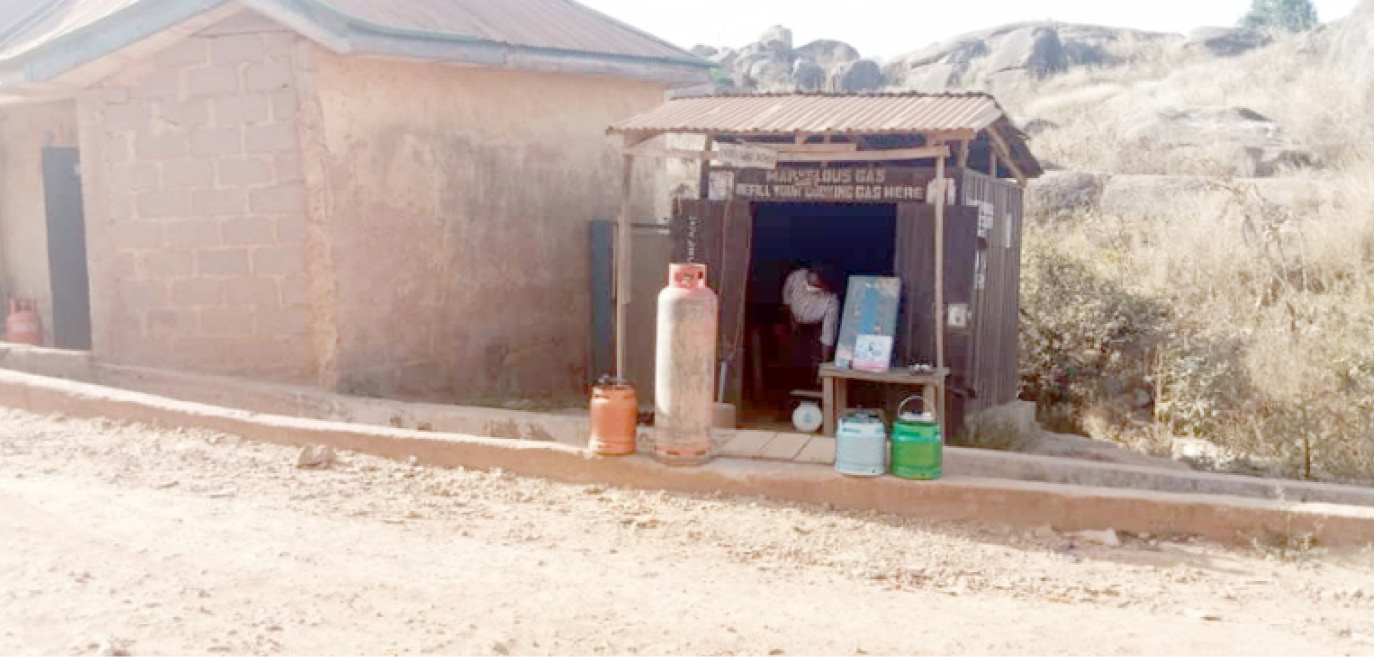Though Liquefied Petroleum Gas (LPG) also known as coking gas is the fastest means of cooking energy, it is damn catastrophic if not properly handled by sellers and users. Coking gas-related tragedies occasioned by explosion have resulted in loss of lives and property worth millions of naira. Some of the cases are not unconnected with siting of gas stations in residential areas. The more stations are located close to residents, the likelihood of their vulnerability to disaster. In places where stations are situated in residential areas and dispensed for household use, people that are conscious of its tragedies live in fear and trepidation. Daily Trust examines proliferation of cooking gas stations in residential areas in some states in consonance with the views of sellers, users, residents as well as associated calamities.
Gas explosion, Daily Trust reports, is a blast that results from mixing gas, especially gas leakage, with air in the presence of an ignition source. In household accidents, the principal explosive gases are those used for heating or cooking purposes, especially natural gas.
- PODCAST: A Deeper Look At How Some Nigerian Elites ‘Siphon’, Hide Loots
- Court remands student who beat Unilorin lecturer
The rate of gas explosion and related devastation being witnessed in different parts of the country has hit an alarming proportion. Recently, there was a gas explosion in Mushin area of Lagos in which five persons lost their lives, while about 15 vehicles and many houses were destroyed.
Jos
Residents living close to gas stations in Jos, the Plateau State capital, have expressed concerns over location and proliferation of gas plants in residential areas. They have also expressed concerns that majority of the outlets are sited not only in residential but also other public areas, leaving people in such places exposed to danger.
Dealers, in a chat with our correspondent, however, assured that they had put in place some necessary measures to curtail any unforeseen tragedy.
Our correspondent gathered that though there hasn’t been any major gas explosion in Jos as experienced in other states, residents had called on government to control the increasing activities of local gas refilling outlets.

A gas user in Jos who resides in Kufang, Jos South LGA, Isaac Abraham, said government needed to regulate the activities of gas retailers and should not wait until a tragedy occurs before taking a preventive measure.
He said one of the reasons gas explosions had become minimal in the state was due to the cold weather in the state which is very friendly to gas cylinders.
Another gas user, Carolyn Yusuf, said the state had experienced a lot of crises so much that any other disaster such as gas mishap would be one too many.
Yusuf who spoke to our correspondent at Old Airport Junction in Jos, expressed worries over indiscriminate siting of gas outlets in crowded areas. She called on government to monitor gas business activities, including sale, usage and location.
A gas dealer at Tudun Wada area of Jos North, Rebecca Pam, said she had been dispensing gas to customers for years now without any hitch. She said she had carefully studied gas business and obeys precautions accordingly to avoid disaster.
Pam added that her gas outlet was not in a compact residential area and always paid a proper attention to the business activities to forestall any unforeseen crisis because she, too, could be at risk if she operates carelessly.
She explained that most gas explosions were due to siting of outlets close to food, meat and other things that release heat energy as well as use of phones around gas cylinders, especially Bluetooth and leaking cylinders. She called on gas dealers and users to be safety-conscious.
Minna
Our correspondent gathered that in Minna, the capital of Niger State, not less than 10 cooking gas stations are located in residential areas. One of the residents, Suleiman Mohammed, who lives very close to a gas station, said they had no choice but to cohabit with such dealers because they could not ask them to leave. He, however, said they were aware of the dangers that siting of such stations pose to the communities.
The chairman of Admar Blue Cooking Gas, Minna, Aliyu Gado, said measures had been put in place to address any unforeseen circumstances. He said vehicles were not allowed into the station, except when necessary. He added that alarms had been stationed to detect any danger around the place.
“At the back of the station, there is a perimeter fence and from our fence, there is a 15-meter distance to houses. All the spaces belong to us. So, there is a bit of distance between us and the houses. Also, we have fire alarms and fire extinguishers stationed everywhere at our station in case of any emergency. These tools are supposed to be at every gas station,” he said.
One of the attendants who preferred anonymity said phone calls were not allowed at the station. He said that phone radiations could lead to gas explosion, adding that inscriptions had been written on the walls to serve as a warning and safety measure to dealers and buyers.
Lagos
In Lagos, there is palpable tension in areas where Liquefied Petroleum Gas (LPG) popularly called cooking gas facilities are located due to attendant tragedies. The tension has heightened due to the recent gas leakages and explosions witnessed in Mushin area. Five persons died in the incident which occurred on Ojekunle Street, off Ladipo Street. About 15 vehicles and many houses were also destroyed.
The state, with an estimated population of 22 million people, has also witnessed similar explosions, especially in the densely populated areas. This has
raised questions about the siting of gas stations and shops in residential areas. Some of the stations are also sited close to schools and other public buildings.

Residents lament
Chukwudi Emenalo who resides in Ketu area of Ijanikin said: “I have heard people complain that managements of stations do not take issues of emergency serious. In case of explosion, what becomes the fate of the residents of the area. The closest place where a firefighting equipment is stationed is inside the headquarters of Ojo Local Government Area. With the terrible traffic situation, coupled with bad road network, how can explosion emergency be handled? Won’t the entire area be up in flames before the arrival of the rescue effort?”
Shade Majekodumo who resides in Igando called on the government to urgently address the setting up of gas stations in residential areas. She expressed worries that people with little or no knowledge of how to handle the flammable liquid are now venturing into the business.
“Even, retailers now hoard gas cylinders in shops because of the rise in the price of the product with a view to making more money because Christmas celebration draws nearer. Up till now, I don’t think there is any monitoring team to monitor these lapses in the sector,” she said.
An official of the Nigerian Correctional Service in Kirikiri Town said the area had been a disaster in waiting, considering the setting up of tank farms and gas stations in the area.
“Initially, our fear was the siting of the tank farms. But nowadays, owners are now adding gas loading stations inside their facilities. What this means is that the area can go up in flames anytime,” the official said.
Mr Bajowa, former staffer of defunct DPR, said government was only paying a lip service to the situation.
“It is the fault of the state government. They issue operational licenses to party members and friends without regard to safety,” he added.
Lagos fails to enforce law on setting up of gas stations
To address the rising incidence of gas explosions and its attendant consequences, the Lagos State Government, in October 2020, banned the siting of gas and fuel stations in densely populated areas, while it announced a plan to clamp down on all illegal LPGs across the state.
In spite of the ban, many cooking gas outlets are not only existing but also proliferating in residential and densely populated areas, particularly in neighbourhoods.
Commissioner for Information and Strategy in Lagos State, Mr Gbenga Omotoso disclosed that there is a law against siting of gas outlets in residential.
He said that the Lagos State Safety Commission monitors such activities, while the State Environmental Protection Agency (LASEPA) oversees issues that bother on pollution. He however lamented that operators of such outlets do not obey the law.
“When government seals their outlets, they go behind to open and continue operation,” he said.
He urged residents to raise the alarm whenever they see such outlets being erected in their neighbourhood.
Last year, the Commissioner for Physical Planning and Urban Development, Dr Idris Salako, at a meeting with District Officers and Supervisory Directors at the Lagos State Physical Planning Permit Authority (LASPPPA), disclosed that only 17 gas filling stations had planning permit.
He stressed that all illegally built outlets as well as those operating in densely populated residential areas would be sealed off to avert mishap.
Expert speaks
The Coordinator of the National Emergency Management Agency (NEMA) in the South-West Region, Ibrahim Farinloye, explained that Nigeria Upstream Petroleum Regulatory Authority (NUPRA) which was formerly DPR LPG or Nigeria Gas Marketing Company in charge of industrial gas has little role to play in the siting of gas centres.
Farinloye said the state government had major roles to play in the siting of such companies. He however, said the role of the DPR or Gas Marketing Company was only to issue or withdraw operating licences in cases of issues arising from their practices.
“The state government has major roles to play in siting of cooking gas station as they have power to allocate and regulate land usage in the state. We have had occasions when gas plants were sealed but reopened,” he said.
“In many cases, NEMA had to implore DPR to seal certain plants in Lagos due to distress alerts received from community member.”
The emergency response expert said effective regulations by the state government would go a long way in reducing vulnerability of community members.
“Dangers of siting gas plants in residential or densely populated areas are enormous. Aside from explosion, people can develop asthmatic symptoms due to prolonged and regular inhalation of hazardous materials. It can complicate minor health issues,” he said.
By: Abubakar Akote (Minna), Dickson S. Adama (Jos) Christiana Alabi & Eugene Agha (Lagos)




